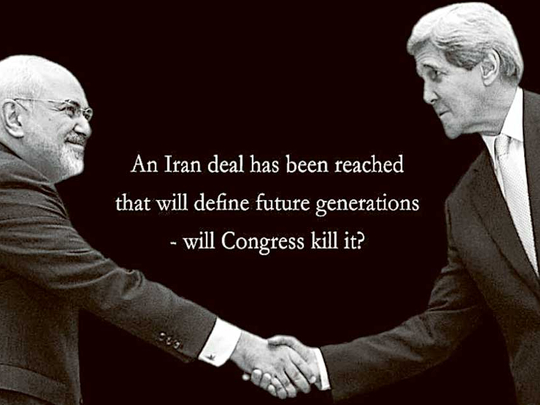
Washington: In 2002, during the run-up to the US invasion of Iraq — and as the possibility of war with Iran loomed — four Iranian-Americans formed the National Iranian American Council (NIAC), largely to voice opposition to war with Iran and urge diplomatic negotiations.
Now, 13 years later, the group is launching an advocacy arm, NIAC Action, that aims to take Iranian-Americans’ voice in politics to the next level. The group, formally announced in June, views the Iran nuclear deal as a critical first test of its effectiveness in influencing US-Iran policy.
“I do see it as a test of our community’s ability, at this crucial moment, to step up to the plate and take our share of influence on the issues that impact us,” said Jamal Abdi, NIAC Action executive director and a former aide to ex-congressman Brian Baird.
NIAC Action, which supports the deal, is a 501(c) 4 and will do more lobbying and political organising than its affiliated group. It is gearing up to endorse lawmakers and candidates viewed as supportive of Iran diplomacy and oppose those who are not. It also plans to seek support, including fund-raising, from prominent Iranian-Americans, including top Silicon Valley executives.
“We want to start organising the money in the community so folks are giving to the right candidates behind this issue,” Abdi said. “That’s something we’ll be ramping up.”
The group ran a full-page ad in The New York Times the day after the nuclear agreement was announced and is planning to run additional ads in local media markets during the 60 days Congress has to review the deal. And, like other groups lobbying in favour of the agreement, it is mobilising its members nationwide — 5,000 who pay dues, and a broader network of 45,000 who attend the group’s events — to go to lawmakers’ town hall meetings during the August recess.
“We think there is now an opening for us to formalise our community’s role in the political process and begin to take all the possibilities our community has — wealth, success in business, education — and organise it behind an effort to have a voice on the issues that matter to us,” Abdi said. “We want to make sure we have a seat at the table.”
NIAC Action has a projected annual budget of $1.5 million (Dh5.5 million) and is funded through member donations and a grant from NIAC, whose donors include the Rockefeller Brothers Fund and Ploughshares Fund.
It has developed a “scorecard” that assigns lawmakers a letter grade from A to F based on criteria it considers important in gauging their commitment to diplomacy, such as their voting record on sanctions and whether they attended Israeli Prime Minister Benjamin Netanyahu’s February 2015 speech to Congress in which he forcefully argued against the Iran deal.












